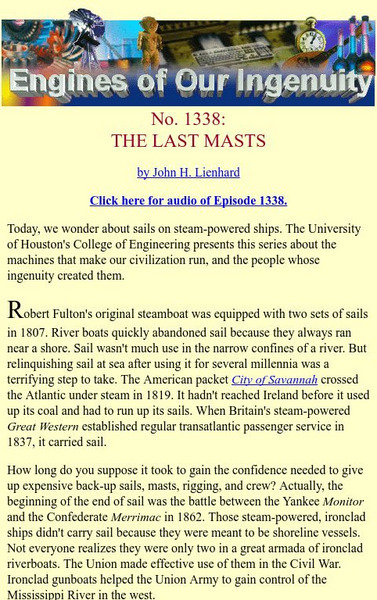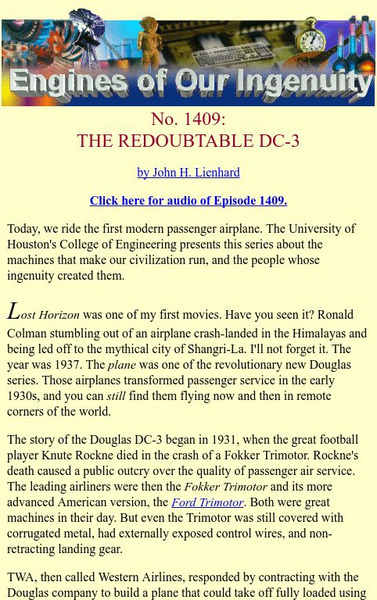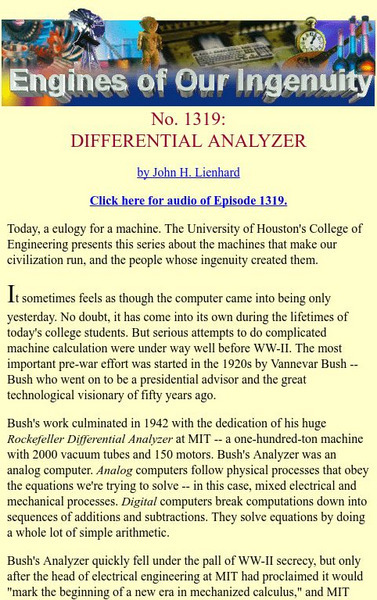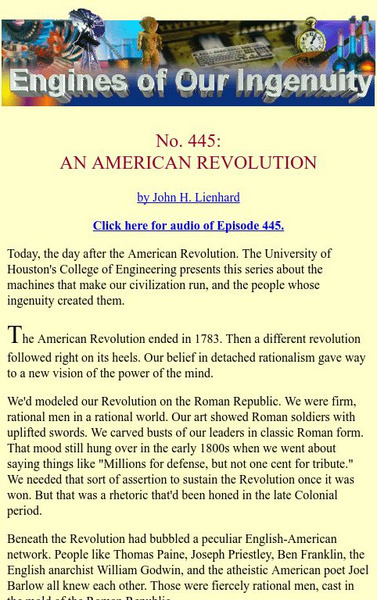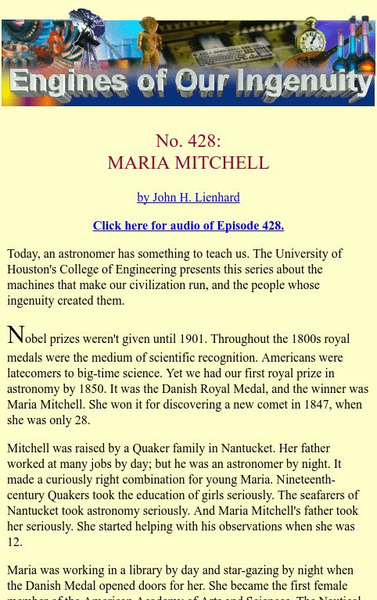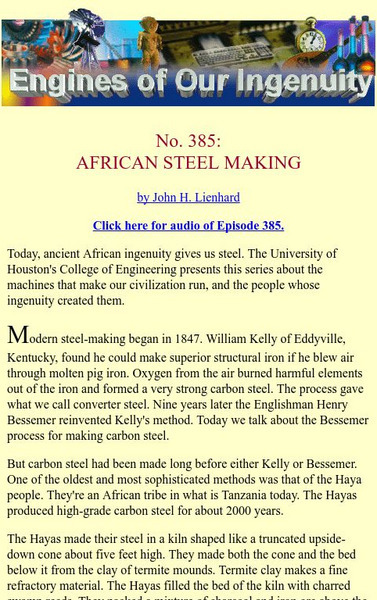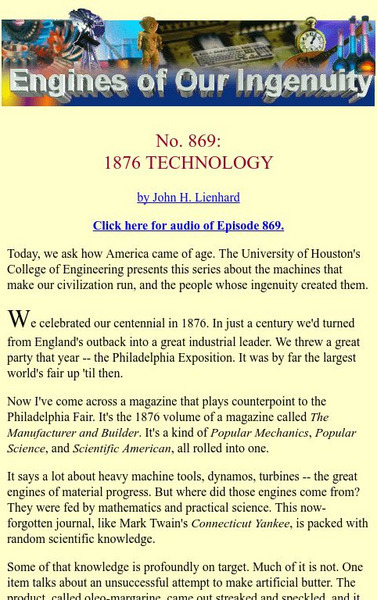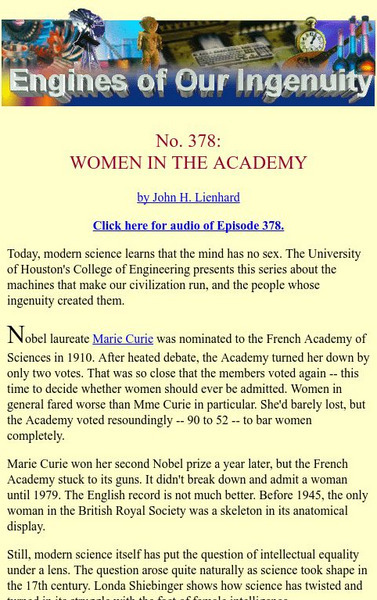University of Houston
University of Houston: Engines of Our Ingenuity: No. 1373: Pittsburgh in 1816
Pittsburgh had a unique place in the nation after the War of 1812. It was an inland city and a rich source of iron. As such, it needed access to water for transport, and some of the first steamboats were used here. Read more about...
University of Houston
University of Houston: Engines of Our Ingenuity: No. 1420: The Erie Canal
Read about the history of the Erie Canal and the impact it had on the economy in this article, which is a transcript of a radio broadcast.
University of Houston
University of Houston: Engines of Our Ingenuity: No. 1338: The Last Masts
Read about the history of the steamboat and the difficult transition that led to the eventual relinquishing of a ship's sails. This article is a transcript of a radio broadcast.
University of Houston
University of Houston: Engines of Our Ingenuity: No. 1342: Wright and Langley
Read about the controversy that emerged over the authenticity of Samuel Pierpoint Langley's flying machine, and the response of the Wright Brothers to attempts to usurp their place in history. This is a transcript of a radio broadcast.
University of Houston
University of Houston: Engines of Our Ingenuity: No. 1418: The Influence of War
Does war inevitably advance the invention of new technology? Read this explanation of why this commonly held belief may not be true, at least in the example of military aircraft. This is a transcript of a radio broadcast.
University of Houston
University of Houston: Engines of Our Ingenuity: No. 1409: The Redoubtable Dc 3
Read about the success of the DC-3 passenger plane, which went into use in 1936, in overcoming the difficulties such planes had encountered up until then. This is a transcript of a radio broadcast.
University of Houston
University of Houston: Engines of Our Ingenuity: No. 1319: Differential Analyzer
Read about the work of Vannevar Bush, who invented the differential analyzer, an analog computer. This is a transcript of a radio broadcast.
University of Houston
University of Houston: Engines of Our Ingenuity: No. 1393: Inventing the Telegraph
Read about the history of the telegraph in this article, which is a transcript of a radio broadcast.
University of Houston
University of Houston: Engines of Our Ingenuity: No. 445: An American Revolution
After the American Revolution, creativity began to flourish as writers and Romantic poets inspired the nation to re-invent itself. That public sensibility is briefly described in this article, which is a transcript of a radio broadcast.
University of Houston
University of Houston: Engines of Our Ingenuity: No. 428: Maria Mitchell
Read about Maria Mitchell, one of the first female astronomers, in this transcript of a radio broadcast.
University of Houston
University of Houston: Engines of Our Ingenuity: No. 385: African Steel Making
Learn about the Hayas of Africa who made steel thousands of years before modern times. This article is a transcript of a radio broadcast.
University of Houston
University of Houston: Engines of Our Ingenuity: No. 429: The Mismeasure of Man
Read about the work of Louis Agassiz and Samuel Morton, who tried to quantify humans into racial stereotypes. This article is a transcript of a radio broadcast.
University of Houston
University of Houston: Engines of Our Ingenuity: No. 283: Aeronautics: 1869
Learn about the first efforts to build a flying machine in this discussion of a Harper's magazine article from 1869 in this transcript of a radio broadcast.
University of Houston
University of Houston: Engines of Our Ingenuity: No. 869: 1876 Technology
Learn about the information that can be found in an 1876 issue of a magazine, The Manufacturer and Builder, about the tools, machines, and innovations of that era, including a reference to a young Thomas Edison. This is a transcript of a...
University of Houston
University of Houston: Engines of Our Ingenuity: No. 508: Ferris's Wheel
Learn about the history of the Ferris wheel in this transcript of a radio broadcast.
University of Houston
University of Houston: Engines of Our Ingenuity: No. 403: Digging Through Panama
Read about the history of the Panama Canal in this article, which is a transcript of a radio broadcast.
University of Houston
University of Houston: Engines of Our Ingenuity: No. 413: Edwin Hubble
Learn about Edwin Hubble and the impact his ideas had on the field of astronomy in this article, which is a transcript of a radio broadcast.
University of Houston
University of Houston: Engines of Our Ingenuity: No. 1346: 1900
Learn about America in 1900 in this discussion of the content from an issue of a magazine called The World's Work. It provides a snapshot of a young America at the start of the 20th century. This is a transcript of a radio broadcast.
University of Houston
University of Houston: Engines of Our Ingenuity: No. 378: Women in the Academy
Read about the struggles of scientific women to become recognized as the intellectual equals of men. This is a transcript of a radio broadcast.
University of Houston
University of Houston: Engines of Our Ingenuity: No. 824: Scopes Trial
In this transcript of a radio broadcast, we learn about the Scopes Trial of 1925, which pitted creationists against evolutionists.
University of Houston
University of Houston: Engines of Our Ingenuity: No. 423: Terman and Silicon Valley
Read about Frederick Terman, a Stanford University professor, who was largely responsible for the growth of Silicon Valley in California. This is a transcript of a radio broadcast.
University of Houston
University of Houston: Engines of Our Ingenuity: No. 1532: Typewriters
Read about the history of the lowly typewriter in this article, which is a transcript of a radio broadcast.
Stanford University
Riverwalk Jazz: Speakeasies, Flappers, and Red Hot Jazz: Music of Prohibition
Script of a radio broadcast about Prohibition and Jazz Age America comments on black market bootlegging, jazz music, speakeasies, flappers, and women`s suffrage.
University of Houston
University of Houston: Engines of Our Ingenuity: No. 383: Wooden Clocks
Read about the impact of the humble wooden clock on life for a frontier farming family in this article, which is a transcript of a radio broadcast.
Other popular searches
- Radio Broadcasts
- Radio Broadcasting
- 1920s Radio Broadcast
- Radio Broadcast Script
- Radio Broadcast Assessment
- Talk Show Radio Broadcast
- Radio Broadcast in 1930s
- Radio Broadcast Project
- Radio Broadcasting and Wnw2
- Careers in Radio Broadcast
- Radio Broadcast Plan
- Radio Broadcasting and Ww2




